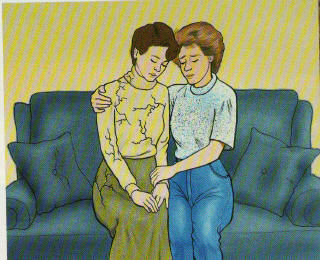Evangelism: Sharing Your Faith… With Another Christian

Everyone needs an Aunt Helen. My Aunt Helen was a schoolteacher for many years along the stormy windblown coast of the place I call home. She was my teacher those first four years in the little one-room school that lives on in my memory. It was Helen who helped plant in me a love for learning that has endured. I remember her sharing with me newspapers and Life magazines in the 1950s. That was the beginning of a worldview that has stayed with me as a teacher, journalist and minister.
Helen is also a deeply committed Christian. Not long ago, she was presented a plaque for more than 60 years of devoted service to her local church. At age 80-something, she is still an active, visible member of the choir. Most of the resident ministers who have served in her area over the years have found her a loyal, sympathetic friend and ally.
When I was 7 years old, I did one of those silly, stupid things that children do. My parents were upset. We were a close family, so the rejection and anger I felt from my parents cut me deeply. I was crushed. Hurt. Troubled. But I didn’t know what to do or where to turn. But Helen did. She could see exactly what I was feeling. She knew just what to do.
Quietly but deliberately, she took me upstairs to her room. We both knelt by the side of the bed. Then she told me, “All you have to do is close your eyes and tell God you are sorry, and he will forgive you.” I did what I was told. And—guess what?—it worked. I felt forgiven, pardoned, restored, clean. No penance, no agonized harangue, no great spiritual pyrotechnics. I didn’t have to carry the guilt anymore.
That’s probably when I came to Christ, when I began to realize that God is a God of love, that—as I explained later to other people as a pastor and youth leader—God is in the “forgiveness business.” I needed to hear that at age 7. Some of you reading these words now need to hear them at age 17 and age 70, or any other age.
A friend in need
As Christians, no matter how converted, no matter how yielded to God, each of us will reach a point when we feel like giving up, when we need someone to give us a boost along the road to life. This may happen more than once. It has to me. At such times, we need the loving attention of a friend or acquaintance in the faith. We need a friend who can speak to the heart of the matter in a way that will inspire us to want to carry on.
And sometimes we need to be that kind of person, too. In some ways, as Helen might say, that’s what we are here for. The apostle Paul knew this. The subject appears often in his writings: “Do not let any unwholesome talk come out of your mouths, but only what is helpful for building others up according to their needs, that it may benefit those who listen” (Ephesians 4:29).
To the Colossians he outlined the principles of mutual sharing and encouragement as vital to Christian growth: “Let the peace of Christ rule in your hearts, since as members of one body you ere called to peace. And be thankful. Let the word of Christ dwell in you richly as you teach and admonish one another with all wisdom, and as you sing psalms, hymns and spiritual songs with gratitude in your hearts to God” (Colossians 3:15-16).
Son of encouragement
But Paul was only human. He wasn’t perfect. His deeds didn’t always match his words. There was the incident with Mark, for example. On Paul’s first missionary tour, a young man named John Mark had some kind of disappointing encounter with Paul. “From Paphos, Paul and his companions sailed to Perga in Pamphylia, where John left them to return to Jerusalem” (Acts 13:13).
We know there was friction here because later on Paul and Barnabas disagreed over Mark’s future as a missionary (Acts 15:36-40). But Barnabas had a reputation in the first-century church or generosity, for sticking up for the underdog. His real name was Joseph —Barnabas was a nickname given to him by his Christian friends, meaning “Son of Encouragement” (Acts 4:36).
Barnabas saw that Mark had a lot of promise. As a young man, Mark may have been a witness to many of the events he writes about in the second Gospel. Now he needed the steady hand of an older brother in the faith, someone to listen to him, to speak words of encouragement, to help steady his footsteps in the faith.
Barnabas took Mark, his nephew, with him to the Cyprus ministry. On the way to Cyprus, Barnabas and Mark no doubt talked about more than just the weather. Sharing with Barnabas was just the tonic for John Mark. Even Paul had to concede that the young man had changed: “Get Mark and bring him with you, because he is helpful to me in my ministry” (2 Timothy 4:11).
Barnabas knew how to encourage a fellow believer. He knew how to share his faith. How about you and me? Do we know how to share our faith with a fellow Christian?
Beyond clever arguments
Here are some principles that can help us learn to share our faith with a believer:
1. Be sensitive to people’s needs. Those who have the most success in encouraging their brothers and sisters are usually sensitive people. An untypical remark, a strange comment, a critical or disturbed attitude, a report from a third party—these are signals or emotional cues that a brother or sister may be struggling under a heavy load.
Charles R. Swindoll’s advice on how to share our faith in the painful situation of bereavement holds true for many situations we encounter:
Those who comfort must have a tender heart of understanding. They don’t come to quote verses or leave a stack of literature. They come simply to say they care. Nor do they attempt to erase today’s hurt by emphasizing tomorrow’s hope. They are committed to the support, the understanding of the grieving. Few things heal wounded spirits better than the balm of a supportive embrace” (“Growing Strong in the Seasons of Life”)
Figuratively speaking, that embrace can also be a warmth in the eyes, a softness of the countenance, a sympathetic expression that shows our concern for a hurting friend. Clever arguments rarely penetrate a grieving spirit. But rest assured: God will often bring people into contact with us who need our help, our attention, our sympathy and concern. We must be open to such encounters. We must be discerning enough to see the need and concerned enough to want to help.
2. Identify with the person. This doesn’t mean you always have to agree with other people’s complaints, attitudes or accusations. But perhaps they have something on their minds they want to unload, some care pressing them down. In such cases, a brother or sister may not express thoughts or feelings in the best way. Maybe the language even gets a bit rough. The thing to do is to patiently and lovingly stand your ground. Listen, but listen with an open mind.
Experienced counselors know that first reactions from troubled people are often their worst reactions. Sometimes it is necessary to wait till the emotional fog clears, to sort through the barrage of words to pinpoint the real problem. Be respectful of the fact that a fellow Christian is using you as a sounding board, trusting you with his or her deep feelings. After all, with all the pressures on us in this hectic world, if we can’t unload to a good friend in the faith, where can we go?
The task here is to identify with the other person as much as possible. We may want to gently mention that we once shared their viewpoint. We might want to say those two marvelous words, “I understand.” Without compromising your own feelings and convictions, it is not wrong to diplomatically “hold your fire,” to avoid criticism. In times of another person’s great stress and strain, the ability to patiently and sympathetically listen is worth its weight in gold.
Even in his corrective letter to the church at Corinth, the apostle Paul had this approach. Though he had harsh words for them later on, he began by identifying himself with the congregation and its accomplishments:
I always thank God for you because of his grace given you in Christ Jesus. For in him you have been enriched in every way—in all your speaking and in all your knowledge—because our testimony about Christ was confirmed in you. Therefore you do not lack any spiritual gift as you eagerly wait for our Lord Jesus Christ to be revealed. (1 Corinthians 1:4-7)
Even though Paul is writing a corrective letter, even though he has to address fornication and heresy—he still takes time to identify and praise his audience. Above all, he lets the people know they are appreciated. We all need mutual sympathy and support. Often. We all need to be appreciated, to know that our Christian service and life’s efforts are not in vain. And when we are “down,” we need to hear it again and again and again.
3. Be realistic. Don’t promise an injured person “pie in the sky.” The Christian walk is tough. Trivial comments such as “You’ll get over it!” won’t work. The best thing to do in reaching out successfully is to admit our own feelings, confess—where appropriate and when necessary—to our friend our own lacks and needs. This will have a powerful effect in the sharing process.
Paul was not afraid to be autobiographical in his letters to the churches in his care. As he told the Galatians:
For you have heard of my previous way of life in Judaism, how intensely I persecuted the church of God and tried to destroy it. I was advancing in Judaism beyond many Jews of my own age and was extremely zealous for the traditions of my fathers. But when God, who set me apart from birth and called me by his grace, was pleased to reveal his Son in me so that I might preach him among the Gentiles…I went immediately into Arabia and later returned to Damascus. (Galatians 1:13-17)
Every Christian life story is full of fascination and delight. It breathes the spirit of authentic faith and commitment that wounded, troubled people need to hear. Often a believer who is losing perspective can be inspired by the ups and downs, the trials and triumphs of someone else. When we listen with the inner ear, we show we have discovered a great key in sharing our faith.
A little girl once went to comfort a sorrowing mother. “What did you say?” asked her father. “Nothing,” the little girl replied. “I just climbed up on her lap and cried with her.” Every church needs people like that!
Author: Neil Earle

